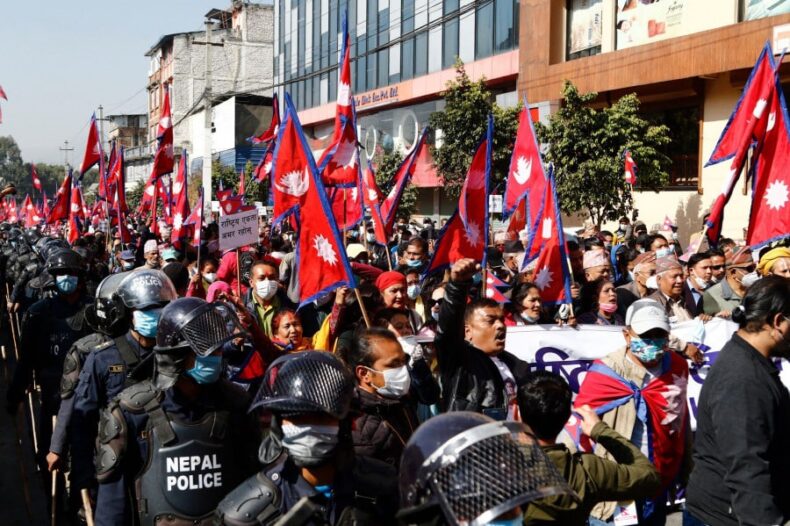
Apart from Bhutan, a hermit kingdom, and Sheikh Hasina’s Bangladesh, the region around India is engulfed in political and economic unrest, with Pakistan, Sri Lanka, and Nepal facing a difficult path to recovery while Burma and Afghanistan are essentially failed nations.

The text discusses Nepal’s political turmoil, which has resulted from a division within the Nepalese Communist Party.
The text discusses Nepal’s political turmoil, which has resulted from a division within the Nepalese Communist Party.
Nepal, which has had 11 different governments in office since the Hindu Himalayan Kingdom became a Republic in 2008, is the most recent country to jump on the bandwagon of political crises. As a result of yet another division within the Nepalese Communist Party, former Maoist leader and current Prime Minister P.K. Dahal, also known as Prachanda, must now ask the Nepali Congress for a vote of confidence in the Parliament. The current situation arose because Dahal’s party opted to back the Nepali Congress nominee for president of Nepal, leaving the CPN (UML) led by K.P. Sharma Oli in the lurch.
The Himalayan Republic has rarely seen political stability since the monarchy’s dissolution, with leaders more interested in power than in giving government to the afflicted and impoverished citizenry. The other game played in Kathmandu pits India against China in exchange for economic or infrastructure assistance.
Even though Nepali politicians seized every opportunity to attack India for political gain, the fact is that Nepal would have been in the same or worse position than Sri Lanka or Pakistan if the Nepali rupee had not been pegged to the Indian rupee at 1.6 and Kathmandu had not been allowed unlimited rupee borrowing from India. The fifth-largest economy in the world must fall for Nepal to fail, to put it simply.

Sri Lanka is on track for greater political and economic unrest unless the US and Japan band together to support the IMF’s loan on arrears support for Colombo to weather the worst economic crisis with a paltry USD 500 million in foreign exchange reserves. The much-needed IMF loan is still waiting for Chinese support for the proposed debt sustainability analysis (DSA). India has backed the plan put forth by the IMF based on the DSA.
The situation in Pakistan is just as bad as it is in the Islamic Republic, which is wracked by famine, fuel shortages, terrorist attacks, and political unrest, with almost all parties failing to provide effective governance.
Quite apart from the refinancing of debts by big brother China, the Pakistani rupee-US dollar exchange rate is quite high, and foreign exchange reserves are at rock bottom. Despite the impending catastrophe, the Pakistani deep state is still engaging in nefarious activities in India by encouraging Sikh radicalism in Punjab and pursuing defenseless Kashmiri Pandits in the Valley. The Durand Line serves as the international border between Afghanistan and the Islamic Republic, which is also supporting terror organizations hostile to the country’s dominant Sunni Pashtun army.

Afghanistan under the Taliban is still not recognized by the international community, including its former mentor, Pakistan. Minorities, women, and children are suffering because of the conflict between the ultra-conservative Kandahari branch and the pragmatic Kabul faction of the Taliban. The feud between President I.M. Solih and Prime Minister Mohammed Nasheed has reached a new level while the Maldives’ economy is still reeling from the devastating effects of the global pandemic. Global outcast Myanmar is ruled by a military junta, with no prospect of returning to a democratic or semi-democratic system in the foreseeable future. Myanmar is essentially a client state of China, with the poverty-stricken populace having no say in governmental matters.

Surrounded by neighbors in major political and economic instability, India must guarantee that Bangladesh is not driven into a similar position as the country prepares for a general election in January 2024. With the level of Islamic radicalization in Bangladesh, Prime Minister Sheikh Hasina will go up against the extreme Bangladesh Nationalist Party of Khaleda Zia, which has been out of power since 2006 and receives covert support from other Islamist organizations there. Considering the turmoil in the region, Prime Minister Narendra Modi cannot afford to let India’s security down.













